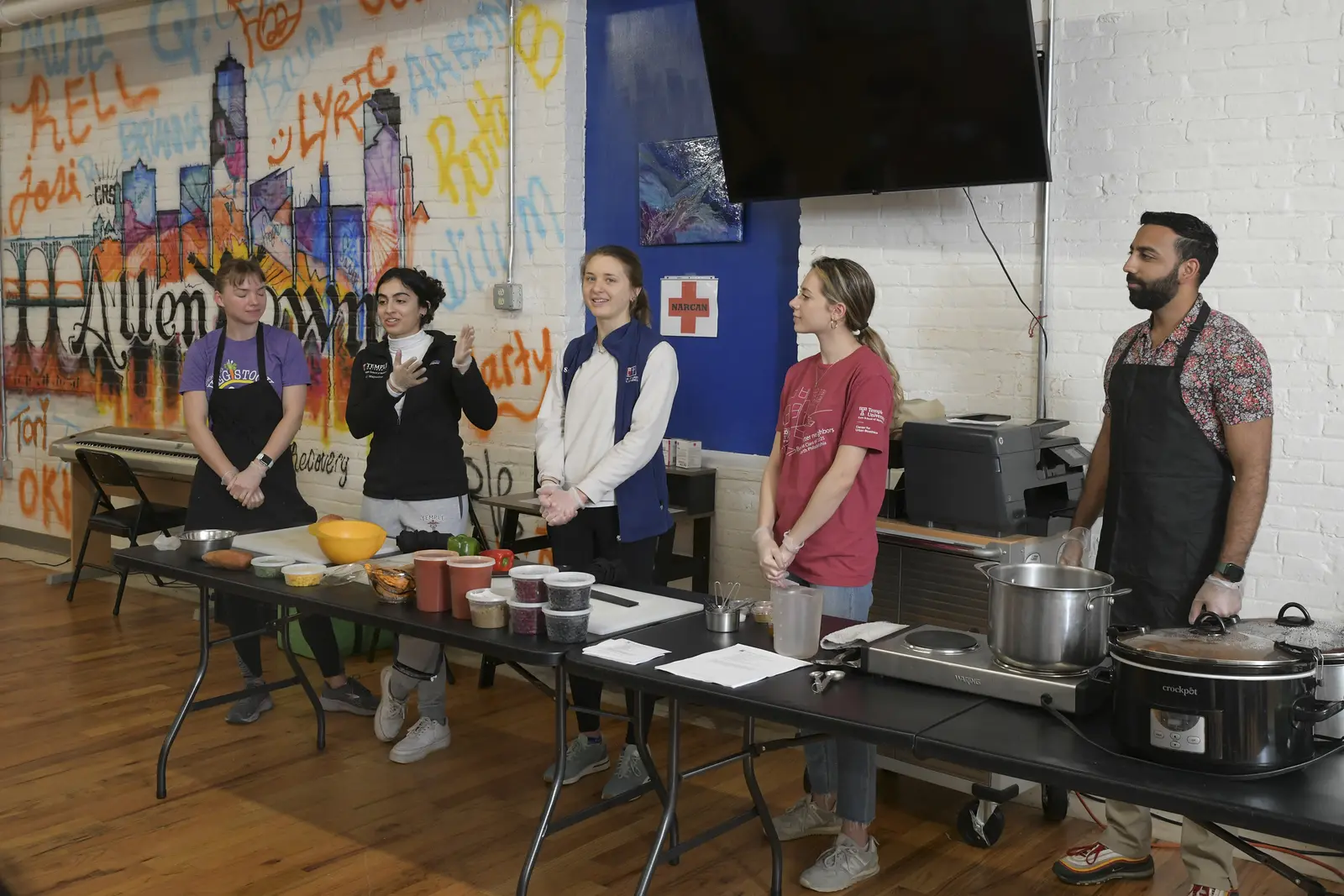

 Quality Awards
Quality Awards

A 2023 SLICC healthy cooking demo.
Temple/St. Luke’s medical students will celebrate an early Thanksgiving on Nov. 14, 5:30-7:30 p.m., as they welcome the community to the newly relocated Student-led Interprofessional Care Center, SLICC, on the second floor of the Star Community Health Family Medicine’s Sigal Center at 450 Chew St. in downtown Allentown.
SLICC, which opened last year at 315 West Linden St., serves vulnerable populations by providing free clothes, food, medical care, medicine and referrals to addiction recovery programs. The clinic, which moved to its new location in October, is staffed by volunteer medical students and a physician two Thursday evenings per month.
“It’s a great location at the Sigal Center for the need of our community, because the clinic is closer to bus transportation and to St. Luke’s Sacred Heart Hospital right across Chew St., which is a resource for clients requiring primary care, emergency care and more acute medical services,” said Abigayle Wagner, second year medical student.
According to her classmate, Abishek Somenhalli, “Our main reason for being here is to help people overcome the social determinants of health – barriers that prevent people from living a healthy and fulfilling life.” Social determinants include access to medical care, transportation, education, employment and housing.
“Our goal at the clinic is to help people access the healthcare system so they can have routine care or more advanced care; with this location, we believe that gap will be bridged much easier, because everything here is nearby and free,” said Somenhalli.
The new SLICC, which measures 1,600 square-feet, comprises a large meeting/waiting room, reception desk, two examination rooms, two bathrooms and storage closets. The facility previously served as a maternal/fetal medicine office.
“It’s a better use of space, includes more ‘medical’ rooms, more privacy and is closer to the hospital,” added Wagner. St. Luke’s family medicine physician Ronald Buckley, MD, will provide medical care each evening it is open. All services continue to be free-of-charge.
Somenhalli said they expect to be able to “increase services we can provide to clients here, including free testing-- for diabetes, pregnancy, COVID, flu and strep-- medications and treatment referrals for specialty care.”
According to Taj Singh, fourth-year medical student who helped found the original clinic, "The Temple-St. Luke's students’ aim is to continue to build back trust with the Allentown community and healthcare providers. Underserved communities have historically had strained relationships with their providers, and SLICC offers a trusting space with free access to care."
Between May 2023-September 2024, the original clinic’s first year of operation, the volunteers at an average of 12 visits per month. About 44 medical students volunteered there during the inaugural year, performing initial histories and physicals for the patients, distributing food and clothes and making referrals. Since the West Linden St. clinic closed, fliers, social media and word-of-mouth have been spread used to the word of the facility’s relocation and upcoming opening activities, including the opening event on Nov. 14.
The original SLICC shared a space that was leased by Treatment Trends, Inc, during the day, where clients, in all phases of substance disorder and recovery, drop-ins and people experiencing homelessness visited. TTI moved out of the facility in the summer and relocated to 24 S 5th St, Allentown, PA 18101.
Marie Hendrix, a TTI outreach and recovery specialist, said she has been sharing news of the SLICC’s relocation and has responded to callers asking where it has moved. She will continue to perform outreach and referrals at the new clinic as she did the original location.
According to Ikemefuna (Ike) Akusoba, MD, the medical students’ mentor, bariatric surgeon and director of student advocacy and community engagement at Temple/St. Luke’s School of Medicine, volunteering there helps prepare these doctors-in-training for a career centered around forming close relationships and medically serving diverse, economically challenged patient populations who might otherwise have to forego services essential for a healthy life.
“Working at the center helps these students develop their primary care clinical skills, understand and address barriers to health and learn how to help our struggling, underserved populations to help themselves.”